|
|
|
Sort Order |
|
|
|
Items / Page
|
|
|
|
|
|
|
| Srl | Item |
| 1 |
ID:
193483
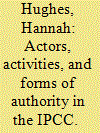

|
|
|
|
|
| Summary/Abstract |
Scholarship on global environmental assessments call for these organisations to become more reflexive to address challenges around participation, inclusivity of perspectives, and responsivity to the policy domains they inform. However, there has been less call for reflexivity in IPCC scholarship or closer examination of how routine concepts condition scholarly understanding by focusing on science and politics over other social dynamics. In this article, I suggest that scholarly reflexivity could advance new analytical approaches that provide practical insights for changing organisational structures. Through reflecting on my understanding of the IPCC, I develop actors, activities, and forms of authority as a new analytical framework for studying international organisations and knowledge bodies. Through its application, I describe the social order of the IPCC within and between the panel, the bureau, the technical support units, the secretariat and the authors, which is revealing of which actors, on the basis of what authority, have symbolic power over the writing of climate change. The fine-grained analysis of organisations enabled by this analytical framework reveals how dominance can and is being remade through intergovernmental relations and potentially, identifies avenues that managers of these bodies can pursue to challenge it.
|
|
|
|
|
|
|
|
|
|
|
|
|
|
|
|
| 2 |
ID:
193484
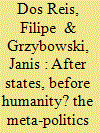

|
|
|
|
|
| Summary/Abstract |
In the debate on the (de-)judicialisation of international affairs and the International Criminal Court (ICC) specifically, the distinctions between legality and politics and between state sovereignty and the international remain contested. While realist and legalist approaches discuss the transformation of international politics by international criminal law, sociological and critical-legal perspectives instead highlight the politics of international criminal law. In this contribution, we focus on how the distinctions between (international) law and politics matter, not as substantively opposed spheres, but as boundaries that the ICC itself contingently and flexibly draws when considering particular situations. These meta-politics of invoking and reproducing key boundaries in seemingly technical elaborations of the interest of justice, the scope of its jurisdiction, or the application of complementarity reflect the Court’s particular authority but also its predicament of pushing for an international criminal law serving humanity, rather than states, while reproducing the distinctions between (international) law and politics. We illustrate the Court’s meta-politics by revisiting three recent decisions of the ICC to (not) investigate alleged international crimes committed by British forces in Iraq, by the Taliban, governmental, and US forces in Afghanistan, and by Israeli authorities and Palestinian groups in the West Bank, East Jerusalem, and Gaza.
|
|
|
|
|
|
|
|
|
|
|
|
|
|
|
|
| 3 |
ID:
193482


|
|
|
|
|
| Summary/Abstract |
To what extent has the glass ceiling in global governance been shattered? To answer this question, we need to look beyond the numbers on women’s representation and study how far women are perceived as inspiring and visionary leaders in global governance. This article offers an analysis of perceptions of inspiring and visionary leadership in global multistakeholder initiatives from a gender perspective. Based on 467 interviews with participants in a leading multistakeholder initiative, the Internet Corporation for Assigned Names and Numbers (ICANN), it presents four findings: (1) respondents identify more men than women as inspiring and visionary leaders, with the difference roughly corresponding to the share of women in leadership roles; (2) respondents tend to ascribe more leadership attributes to women than to men when explaining why they find them inspiring and visionary; (3) both feminine and masculine leadership traits are appreciated in relation to both men and women leaders at ICANN; (4) female respondents identify more women as inspiring and visionary leaders than male respondents. These findings contribute novel insights into gendered perceptions around leadership and the importance of role models in global governance. They also shed much-needed light on the demands and expectations from leadership in global multistakeholder arrangements.
|
|
|
|
|
|
|
|
|
|
|
|
|
|
|
|
| 4 |
ID:
193485
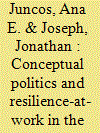

|
|
|
|
|
| Summary/Abstract |
International crises, most recently the Covid-19 pandemic and Russia’s invasion of Ukraine, often radically change our view of the world and our place within it. The European Union (EU) has been particularly impacted by these developments because these crises have accentuated some of its ontological and epistemological uncertainties and insecurities. While the EU’s resilience turn initiated by the EU Global Strategy of 2016 aimed at strengthening the EU’s ability to prepare and recover from external shocks and crises, since then, the concept of resilience has undergone a transformation. In recent years, we have seen the EU turning back in on itself and abandoning the radical aspects of resilience. Hence a paradox has emerged – the more complex the problems faced by the EU, the more it turns away from the logics of complexity present in the idea of resilience. In this article, we examine this conceptual shift through the lenses of concepts in action and the way these have reflected changes in the external context, but also power coalitions and institutional path dependencies. This argument will be explored by examining the recently adopted Strategic Compass and the EU’s Recovery and Resilience Facility (RRF).
|
|
|
|
|
|
|
|
|
|
|
|
|
|
|
|
| 5 |
ID:
193481
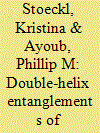

|
|
|
|
|
| Summary/Abstract |
The rights of people who are marginalised by their sexual orientation and gender identity (LGBTI) have improved in many countries. Largely, these achievements can be traced back to the ‘spiral model’ of factors including transnational mobilisation by the LGBTI rights movement, the actions of a few pioneering governments, and advances in the human rights frameworks of some international organisations (IOs). Yet a rising and increasingly globally connected resistance works against LGBTI rights. It rests predominantly in the hands of a transnational advocacy network (TAN) that attempts to lay claim to international human rights law by reinterpreting it. Drawing on a decade of fieldwork and 240 interviews with LGBTI, anti-LGBTI, and state and IO actors, this article explores how the conservative TAN functions, in terms of who comprises it and how its agenda is constructed. We argue that this TAN has employed many of the same transnational tools that garnered LGBTIQ people their widespread recognition. It also conforms to the spiral model of rights diffusion, but in a process we call a double helix. As the double-helix metaphor suggests, rival TANs have a reciprocal relationship, having to navigate each other’s presence in an interactive space and thus using related strategies and instruments for mutually exclusive ends.
|
|
|
|
|
|
|
|
|
|
|
|
|
|
|
|
| 6 |
ID:
193480
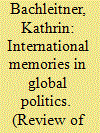

|
|
|
|
|
| Summary/Abstract |
This paper is interested in the role and function of memories in United Nations Security Council debates about humanitarian intervention. It posits that historical experiences and their lessons serve as interpretative devices for the abstract international norms and principles under discussion. The paper speaks of ‘international memories’ where the meaning and lessons derived from the past coalesce among a group of states. Empirically, its case study explores how the memories of totalitarianism/fascism and colonialism were employed in United Nations (UN) representatives’ verbal pleas to intervene in Libya and Syria after the Arab Spring. It finds that those who supported or opposed humanitarian intervention held different interpretations of these memories and their lessons. In each case, however, memories provided essential normative guidance to states when it came to implementing the abstract international principles, norms, and rights that underlie humanitarian intervention.
|
|
|
|
|
|
|
|
|
|
|
|
|
|
|
|
| 7 |
ID:
193478


|
|
|
|
|
| Summary/Abstract |
This article broadens the understanding and empirical study of regime complexes by shifting the focus from the negotiation outcome to the processes of negotiating new international agreements. Although they are important to regime-complex formation and delimitation, the sites where states negotiate new agreements are rather neglected. We aim to enhance the methodological toolbox available to scholars studying global governance in two ways: (1) by demonstrating how dynamic relationships between states and international organisations (IOs) unfolding within the social space of international treaty negotiations contribute to regime-complex formation; and (2) how social network analysis (SNA) can help us to detect patterns in these relationships. Combining participant observation and collaborative event ethnography (CEE) with social network analysis, we present new empirical material illustrating how we delimited a regime complex and how IOs interact throughout the negotiation process. We applied our methodology to the case of marine-biodiversity governance and use observational data collected during three intergovernmental conferences (IGCs) (2018–19) on a new treaty for the conservation and sustainable use of marine biodiversity beyond national jurisdiction (BBNJ) for our analysis. We discuss the results in relation to our approach’s strengths and weaknesses and implications for future research on regime complexity.
|
|
|
|
|
|
|
|
|
|
|
|
|
|
|
|
| 8 |
ID:
193479
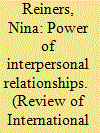

|
|
|
|
|
| Summary/Abstract |
This article further develops and illustrates the argument that relationships between individuals help to explain the success of human rights advocacy in international institutions. Drawing from advocacy theory and socio-legal studies, I shift the attention from collective forms of advocacy to the importance of interpersonal relationships of advocates with individuals in international institutions to influence the development of human rights. I introduce a framework consisting of three analytical steps – mapping the key actors in a network, process-tracing, and biographical research – and apply the framework to three cases of norm development by a United Nations human rights treaty body. My findings highlight the power of interpersonal relationships for the making of human rights, and they inform scholarship on transnational elites, human rights advocacy, and the politics of international law.
|
|
|
|
|
|
|
|
|
|
|
|
|
|
|
|
| 9 |
ID:
193486
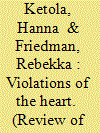

|
|
|
|
|
| Summary/Abstract |
This article examines ‘parental harm’ – a harm that occurs when a parent loses or faces the threat of losing a child. We contend that the manipulation and severing of relationships between parents and children has played a central role in war and oppression across historical contexts. Parental harm has long-term and pervasive effects and results in complex legacies for carers and their communities. Despite its grave impact, there is little research within International Relations into parental harm and understanding of its effects. We conceptualise parental harm through two frames – the ‘harm of separation’ and ‘harm to the ability to parent’ – and theorise gendered dimensions of how it is perpetuated and experienced. As such, we advance feminist understandings of family as a gendered institution that shapes the conduct of war and institutionalises racialised oppression. Our conception of parental harm offers novel insights into the relationship between intimate relations, the family, and state power and practices. We illustrate our conceptual arguments through two examples: the control and manipulation of family in antebellum slavery in the United States and the targeting of Tamil children in disappearances in Sri Lanka. These examples demonstrate the pervasiveness of parental harm across contexts and forms of violence.
|
|
|
|
|
|
|
|
|
|
|
|
|
|
|
|
| 10 |
ID:
193487
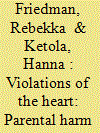

|
|
|
|
|
|
|
|